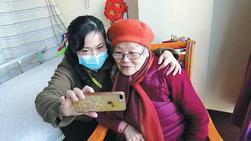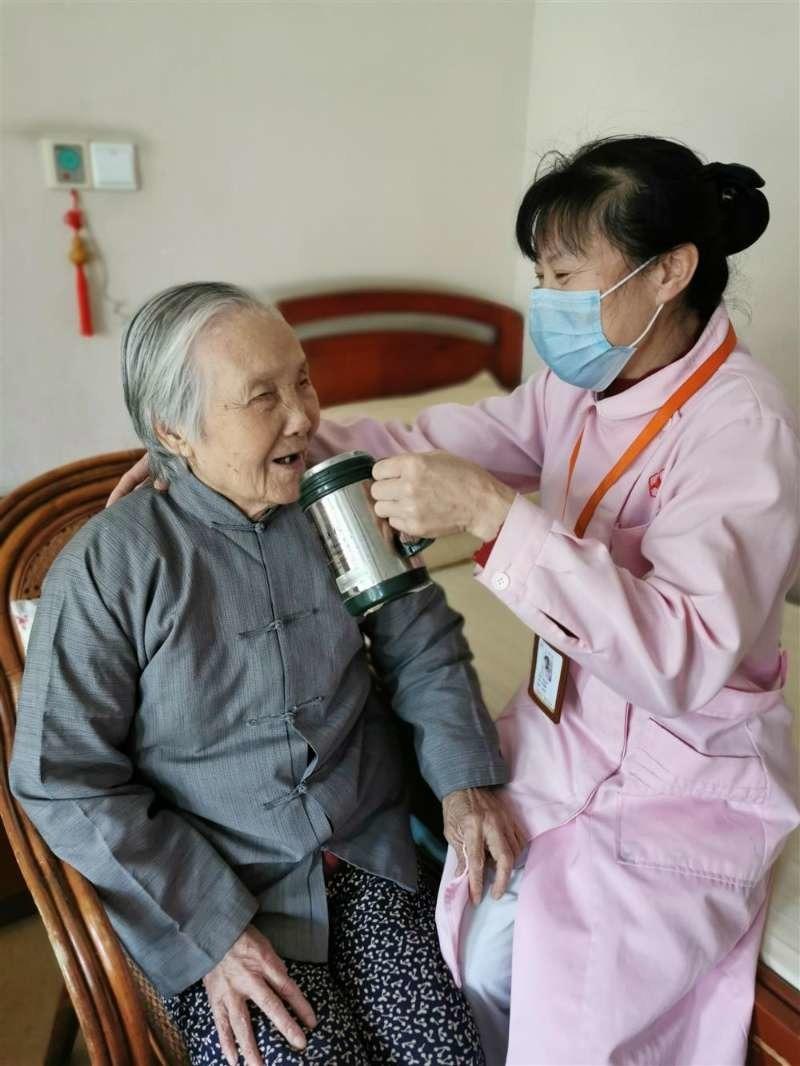 A caretaker at the Tianbao Nursing Home in Shanghai helps a resident make a video call to her family. (PHOTO PROVIDED TO CHINA DAILY)
A caretaker at the Tianbao Nursing Home in Shanghai helps a resident make a video call to her family. (PHOTO PROVIDED TO CHINA DAILY)
Nursing homes take precautions to protect residents' health during the novel coronavirus outbreak.
Eighty-seven-year-old Bao Zhanmei and her 90-year-old brother, Bao Zhankang, live in the same nursing home, but the siblings haven't seen each other for over a month.
The two, who live on different floors of the Tianbao Nursing Home in Shanghai's Hongkou district, used to meet at least twice a week. However, due to the recent outbreak of the novel coronavirus pneumonia, the nursing home has prohibited residents who live on different levels from interacting so as to minimize the risk of potential cross infection.
There are 300 elderly people living in the home.
ALSO READ: Coronavirus: Teaching us a bit about disease, and a lot about ourselves
The pair currently communicate with each other through video calls twice a week with the assistance of social workers.
Shanghai is home to nearly 5 million residents who are at least 60 years old, and the government has emphasized their welfare during the outbreak
According to Huang Qian, the social worker who helps facilitate these calls, Bao Zhanmei has been very worried about her brother's poor physical condition.
"After seeing her brother through the video calls, she felt relieved and happy. They talked about many things through the call," Huang says.
While most people are facing a shortage of protective supplies, the main problem nursing homes face during the outbreak is managing residents' emotions, says Chen Yan, director of the Tianbao Nursing Home.
Shanghai is home to nearly 5 million residents who are at least 60 years old, and the government has emphasized their welfare during the outbreak.
Most nursing homes and senior-care centers have suspended family visits and canceled social activities.
The 804 licensed nursing homes in the city are required to submit daily reports about the status and health of their residents and staffers to the authorities.
According to Jiang Rui, deputy director of the city's civil affairs bureau, more than 3,200 home-based care workers, who are responsible for more than 11,000 elderly residents living alone in the city, have also taken precautions to prevent the spread of the virus.
At the Tianbao Nursing Home, which has been on lockdown since Jan 26, the guard at the main entrance takes down the details and measures the temperature of every person entering and leaving every day.
 The outbreak hasn't compromised care at the Yangpu Community Nursing Home. (PHOTO PROVIDED TO CHINA DAILY)
The outbreak hasn't compromised care at the Yangpu Community Nursing Home. (PHOTO PROVIDED TO CHINA DAILY)
"Many residents are starting to worry because family members and volunteers used to visit them regularly," Chen says.The home has also suspended meal deliveries from families and all supplies brought by family members must be disinfected. Meanwhile, all the residents have been confined to the floors they live on, and meal times have been staggered.
"Our social workers now go to each resident to offer emotional comfort and psychological counseling. We also use WeChat, video calls and phone calls to connect residents with their families, and this has greatly relieved their anxiety."
Chen says staffers have also been using their phones to record what the residents do every day before sending the videos and photos to their families.
Despite the lockdown, nursing homes across the city have tried their best to ensure that the lives of their residents go on as normal.
The Yangpu Community Nursing Home, which has been operating in Shanghai's Yangpu district for 31 years, is home to around 700 people with an average age of 88.6. Most of them have dementia or physical disabilities.
Although the home has since Jan 27 suspended family visits, daily care of the elderly has been completely unaffected, according to director Qiao Yihao.
"Take the food service for example. Some require nasogastric feeding while some need the food to be minced. All these have been well taken care of," Qiao says.
According to Qiao, the medical facility within the nursing home also provides basic diagnoses, treatments and healthcare services for the elderly.
As some caretakers had left the city for Spring Festival and are not able to return due to the outbreak, staffers who are on-site have to work around the clock to keep the home running.
To minimize the risk of getting infected with the novel coronavirus during commutes, the nursing home has provided accommodation within the home for caretakers, doctors and nurses who work for several days per shift.
READ MORE: Daily new recovery cases surpass new infections for 3rd day
There have been occasions when the nursing home has had to cut back on celebrations, Qiao says. For example, a resident's planned 100th birthday banquet in late January had to be canceled because of the outbreak.
"To make things up to him, we prepared 'longevity noodles' and threw him a simple birthday party with the staff," Qiao says.
"During such a special period, this simplicity is also a kind of protection. Thankfully, his family was supportive and understanding of the matter."


